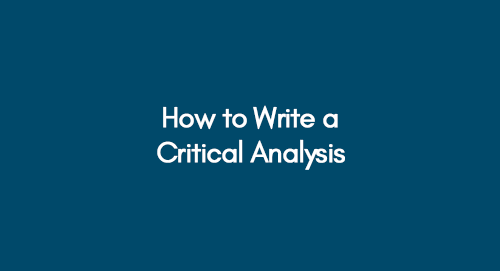
How to Write a Description? | A Comprehensive Guide
July 27, 2023
Footnote Referencing Styles: Academic Writing
July 27, 2023Critical analysis is an evaluation of a particular topic that aims to examine its key components, arguments, and evidence. It presents an overall significance based on critical thinking and logical reasoning.
A critical analysis paper demonstrates critical thinking and observational skills. Whether it is for an article, an assignment, or a dissertation, mastering this skill is an essential requirement in any academic discipline.
In this article, you will find a step-by-step guide and tips on how to write a critical analysis effectively.
You may also like to review the critical analysis examples below;
Example: 1 Critical Analysis of the Business Ethics of British Petroleum
Example: 2 Critical Analysis of Online Co-Creators & Brand Communities
What is Critical Analysis Writing?
Critical analysis writing provides an informed evaluation of the overall significance of the author's research paper, including its methodology, structure, arguments, evidence, and results.
It goes beyond simply summarizing the content; it requires critical thinking, interpretation, and logical reasoning to assess the subject's merits and flaws.
How to Write Critical Analysis: a Step-By-Step Guide
If you're searching for guidance on how to start conducting a critical analysis, you've come to the right place.
We're here to help you improve your critical analysis of any piece of writing and make it more effective. So, stick around!
Critical Reading Before Going to Start Writing
To start critical analysis writing, you need to know how to do critical reading to get information. Here are points that help you;
- Skimming the text: Overview headings, subheadings of the text, and image information.
- While skimming, highlight important paragraphs or write down important points.
- Identify the Author’s thesis's main argument and supporting evidence
Critical Writing of Any Writeup
After completing the critical reading of any book or article, gather all the important points to begin the writing. Here's how:
Strong Introduction
You now have a better understanding of the author's main idea and background. It's time to put the idea together in an attention-grabbing way for readers.
By using critical thinking skills, you can uncover any gaps and inappropriate arguments and provide a strong introduction to any topic.
Write Body
Writing body paragraphs means time to address the main points outlined in your introduction. Two to four body paragraphs are common, but you may have more or fewer paragraphs depending on writing guidelines.
In each body paragraph, you should focus on a single idea from the article. In the first sentence, state the idea, then support it with examples from the work you are analyzing.
It is possible to incorporate quotes from the source that support your claims. If you include quotes, make sure you cite them consistently.
Write Conclusion
In order to conclude your critical analysis, it is important to restate your perspective while building on the statements made in your body paragraphs.
This will bring your analysis to a natural stopping point. Your conclusion may have similar content to your introduction, but it should be expressed differently.
Typically, two to four sentences are sufficient for most well-written conclusions, but complex critical analyses may require multiple paragraphs in the conclusion.
Additional Tips for Your Effective Critical Analysis Writing
To elevate the quality of your critical analyses, adopt proven writing skills that can greatly benefit your writing work. Incorporate the following suggestions into your writing practices to refine your critical analyses:
- Utilize cross-referencing
Throughout the writing process, properly referencing your outline to maintain focus and ensure comprehensive coverage of all intended points.
- Employ transitional words and phrases
Employing transitional words like "therefore" and "in addition" facilitates a smooth flow of ideas, establishing connections between sentences and paragraphs.
- Prioritize conciseness
Crafting concise prose enhances clarity and persuasiveness in your writing, allowing your arguments to be more effectively conveyed.
- Emphasize logical structure
Arrange your critical analyses in a logical manner, enabling ideas to flow naturally and coherently.
- Adopt the third-person voice
Unless specifically instructed otherwise, employing the third-person voice in your critical analysis lends a sense of authority to your work, convincing readers that it is based on facts rather than personal opinions.
Final Thought
Composing a critical analysis involves the skill of offering valuable insights on any topic. By adhering to the steps of critical analysis writing, you can also enhance your ability to produce more effective analyses. Here are also tips that can be helpful in improving your writing and ensuring a better experience for your readers.
For more information and any further assistance, please contact our expert writer’s team or place or order with us.
Get 3+ Free Dissertation Topics within 24 hours?













